在非响应性环境中实现响应性社会工作实践
IF 1.4
4区 社会学
Q3 SOCIAL WORK
引用次数: 0
摘要
本文章由计算机程序翻译,如有差异,请以英文原文为准。
Realising a responsive social work practice in a non-responsive context
ABSTRACT Public welfare actors struggle with the question how they can guarantee children’s wellbeing. The answer to this question depends on the countries’ perspective concerning its responsibility for the care of its citizens. In the Flemish context, a maximalist child protection logic – with a focus on the realisation of rights – is adopted. In this article, we focus on the so-called ‘bottleneck cases’ and use the case of Zoë as a concrete application of the legislative framework that regulates the bottleneck case system. By analysing the case of Zoë, we show that a maximalist policy discourse that is based on commitment towards complex situations sometimes masks a minimalist policy logic. The issue that prompts itself is that this does not mean that a maximalist practice is not realised, but that it is realised because social practitioners deviate from the policy plans, while pretending ‘as if’ they follow them.
求助全文
通过发布文献求助,成功后即可免费获取论文全文。
去求助
来源期刊

Journal of Social Work Practice
SOCIAL WORK-
CiteScore
2.50
自引率
7.10%
发文量
39
期刊介绍:
The Journal of Social Work Practice publishes high quality refereed articles devoted to the exploration and analysis of practice in social welfare and allied health professions from psychodynamic and systemic perspectives. This includes counselling, social care planning, education and training, research, institutional life, management and organisation or policy-making. Articles are also welcome that critically examine the psychodynamic tradition in the light of other theoretical orientations or explanatory systems. The Journal of Social Work Practice is committed to a policy of equal opportunities and actively strives to foster all forms of intercultural dialogue and debate.
 求助内容:
求助内容: 应助结果提醒方式:
应助结果提醒方式:


